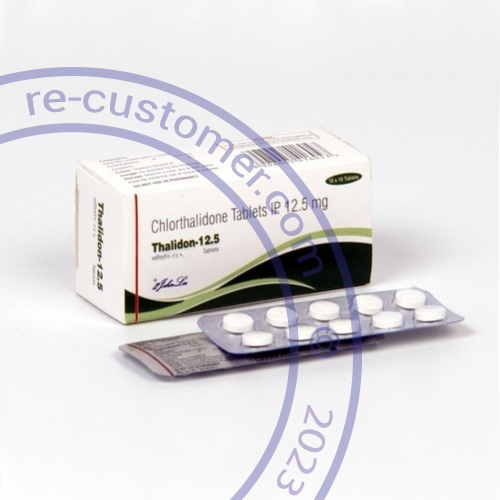
Marca(s): Thalidon
Fabricante: Johnlee Pharmaceuticals
Diseases: Fluid Retention
Known as: Higrotona
| Empaquetado | Precio | Per comprimido | Ahorro | Order |
|---|---|---|---|---|
| 6.25mg × 180 Comprimidos | € 79.96 | € 0.44 | € 159.78 | Añadir a la cesta |
| 6.25mg × 120 Comprimidos | € 71.07 | € 0.59 | € 88.76 | Añadir a la cesta |
| 6.25mg × 90 Comprimidos | € 62.18 | € 0.69 | € 57.69 | Añadir a la cesta |
| 6.25mg × 60 Comprimidos | € 53.29 | € 0.89 | € 26.62 | Añadir a la cesta |
| 6.25mg × 30 Comprimidos | € 39.96 | € 1.33 | Añadir a la cesta |
| Empaquetado | Precio | Per comprimido | Ahorro | Order |
|---|---|---|---|---|
| 12.5mg × 180 Comprimidos | € 88.85 | € 0.49 | € 177.56 | Añadir a la cesta |
| 12.5mg × 120 Comprimidos | € 79.96 | € 0.67 | € 97.65 | Añadir a la cesta |
| 12.5mg × 90 Comprimidos | € 71.07 | € 0.79 | € 62.13 | Añadir a la cesta |
| 12.5mg × 60 Comprimidos | € 62.18 | € 1.04 | € 26.62 | Añadir a la cesta |
| 12.5mg × 30 Comprimidos | € 44.40 | € 1.48 | Añadir a la cesta |
Chlorthalidone tablets
What is chlorthalidone?
Chlorthalidone is a thiazide diuretic (water pill) that helps prevent your body from absorbing too much salt, which can cause fluid retention.
Chlorthalidone treats fluid retention (edema) in people with congestive heart failure, cirrhosis of the liver, or kidney disorders, or edema caused by taking steroids or estrogen.
Chlorthalidone is also used to treat high blood pressure (hypertension).
Warnings
You should not use chlorthalidone if you are unable to urinate, or if you are allergic to sulfa drugs.
Before taking this medicine
You should not use chlorthalidone if you are allergic to it, or if:
- you are unable to urinate; or
- you are allergic to sulfa drugs.
- Tell your doctor if you have ever had:
- kidney disease;
- heart failure;
- gout;
- high cholesterol or triglycerides;
- diabetes; or
- if you are on a low-salt diet.
Tell your doctor if you are pregnant or plan to become pregnant. Taking chlorthalidone during pregnancy may cause side effects in the newborn baby, such as jaundice (yellowing of the skin or eyes), bruising or bleeding, low blood sugar, or an electrolyte imbalance.
Do not start or stop taking chlorthalidone during pregnancy without your doctor's advice. Although chlorthalidone may cause side effects in a newborn, having high blood pressure during pregnancy can cause complications such as diabetes or eclampsia (dangerously high blood pressure that can lead to medical problems in both mother and baby). The benefit of treating hypertension may outweigh any risks to the baby.
You should not breastfeed while using chlorthalidone.
How should I take chlorthalidone?
Follow all directions on your prescription label and read all medication guides or instruction sheets. Your doctor may occasionally change your dose. Use the medicine exactly as directed.
Call your doctor if you are sick with vomiting or diarrhea, or if you are sweating more than usual. You can easily become dehydrated while taking chlorthalidone. This can lead to very low blood pressure, a serious electrolyte imbalance, or kidney failure.
Your blood pressure will need to be checked often. Your blood and urine may both be tested if you have been vomiting or are dehydrated.
chlorthalidone can affect the results of certain medical tests. Tell any doctor who treats you that you are using chlorthalidone.
If you need surgery, tell your surgeon you currently use this medicine.
If you have high blood pressure, keep using this medicine even if you feel well. High blood pressure often has no symptoms. You may need to use blood pressure medicine for the rest of your life.
Store this medicine at room temperature away from moisture, heat, and light. Keep the bottle tightly closed when not in use.
What happens if I miss a dose?
Take the medicine as soon as you can, but skip the missed dose if it is almost time for your next dose. Do not take two doses at one time.
What happens if I overdose?
Overdose symptoms may include nausea, weakness, dizziness, drowsiness, extreme thirst, muscle pain, or rapid heartbeats.
What should I avoid while taking chlorthalidone?
Drinking alcohol with chlorthalidone can cause side effects.
Avoid getting up too fast from a sitting or lying position, or you may feel dizzy.
Avoid becoming overheated or dehydrated during exercise, in hot weather, or by not drinking enough fluids. Follow your doctor's instructions about the type and amount of liquids you should drink. In some cases, drinking too much liquid can be as unsafe as not drinking enough.
Chlorthalidone side effects
Get emergency medical help if you have signs of an allergic reaction: hives; difficult breathing; swelling of your face, lips, tongue, or throat.
Call your doctor at once if you have:
- a light-headed feeling, like you might pass out;
- low sodium--headache, confusion, slurred speech, severe weakness, vomiting, loss of coordination, feeling unsteady;
- low potassium--leg cramps, constipation, irregular heartbeats, fluttering in your chest, increased thirst or urination, numbness or tingling, muscle weakness or limp feeling;
- low magnesium--dizziness, irregular heartbeats, feeling jittery, muscle cramps, muscle spasms, cough or choking feeling; or
- kidney problems--little or no urination, swelling in your feet or ankles, feeling tired or short of breath.
Common side effects may include:
- low blood pressure (feeling light-headed);
- kidney problems;
- dizziness; or
- an electrolyte imbalance (such as low levels of potassium, sodium, or magnesium in your blood).
What other drugs will affect chlorthalidone?
Using chlorthalidone with other drugs that make you light-headed can worsen this effect. Ask your doctor before using opioid medication, a sleeping pill, a muscle relaxer, or medicine for anxiety or seizures.
Tell your doctor about all your other medicines, especially:
- other blood pressure medications;
- lithium;
- digoxin, digitalis;
- insulin or oral diabetes medicine; or
- steroid medicine.
This list is not complete. Other drugs may affect chlorthalidone, including prescription and over-the-counter medicines, vitamins, and herbal products. Not all possible drug interactions are listed here.

Cómo puedo ayudarle?



